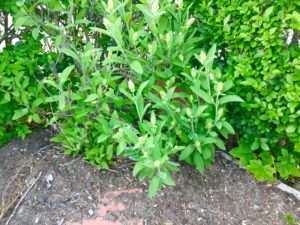At the following words concerning the bread, the Celebrant is to hold it, or lay a hand upon it; and at the words concerning the cup, to hold or place a hand upon the cup and any other vessel containing wine to be consecrated.
On the night he was betrayed he took bread, said the blessing, broke the bread, and gave it to his friends, and said, “Take, eat: This is my Body, which is given for you. Do this for the remembrance of me.”
After supper, he took the cup of wine, gave thanks, and said, “Drink this, all of you: This is my Blood of the new covenant, which is shed for you and for many (all) for the forgiveness of sins. Whenever you drink it, do this for the remembrance of me.”
(Book of Common Prayer, Holy Eucharist Prayer C)
It’s not enough to say the words. The words, the bread, and the wine come with a touch. The sound of voice alone won’t be as meaningful as voice and touch. The words aren’t a generic blessing or a general rule of conduct: this prayer is about this particular day, a particular place, and a very particular gathering of people. It’s not a history lesson or a moral position. This is a connection, a touchpoint. Just as surely as Jesus was present to his disciples, Jesus is present to us. He blesses not just the bread the disciples ate and the wine they sipped: he blesses the food and drink we will be given in this time and place. We are blessed and we are fed – our bodies as well as our spirits.
For me, these words mean something like this:
I love you. I leave with you my blessing. See in your every meal my love – not just in the feasts but in the PBJ’s. When you eat, when you give food to others, my love blesses you.
Incarnation on a plate, the love of God in a cup. For these blessings, we are indeed grateful. Amen.



